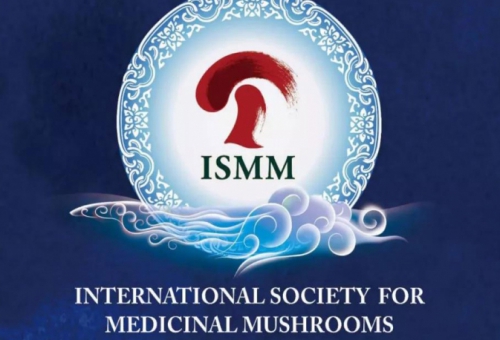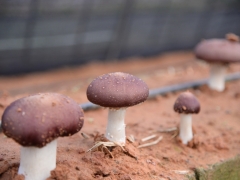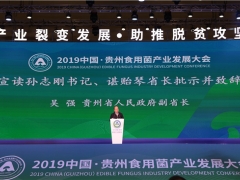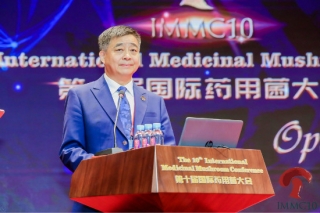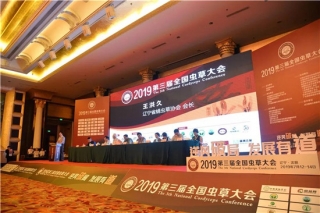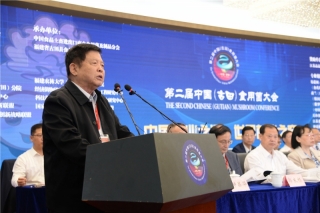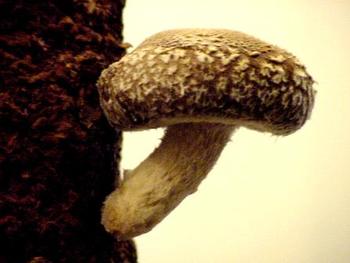
A team of scientists from Hong Kong and Australia say an active compound found in a certain kind of mushroom is the first chemopreventive therapy (The use of chemical agents, drugs or food supplements to prevent cancer) that can suppress prostate cancer cells from developing without any side effects.
The compound called polysaccharopeptide (PSP) is prevalent in commonly edible mushroom known as turkey tail or Yunzhi, which has for a long time been used for medicinal purposes in China, Japan and other Asian countries.
Chinese medicine practitioners have used turkey tail as an immune booster for decades and previous scientific studies have shown that the mushroom contains PSP, a component that is able to suppress tumour growth and halt the progression of prostate cancer.
It is not clear how the scientists discovered PSP but previous studies on turkey tail, mainly by Chinese medicine practitioners, suggests that PSP was recommended for further study in 2011 by Provital Pvt Ltd, a commercial company which also collaborated in the study.
The aim of the study was to find out whether oral consumption of PSP can inhibit the development of prostate cancer tumours within cancer cells.
“Currently there is no effective chemopreventive agent available and some of the tested compounds do have side effects,” said lead scientist, Dr. Patrick Ling, formerly a research assistant professor at the University of Hong Kong and now based at the Australian Prostate Cancer Research Centre at the Queensland University of Technology in Australia.
Breakthrough
According to scientists, PSP does not only suppress the ability of cancer stem cells (cells that cause and spread cancer) to form but also inhibit their ability to generate prostate cancer tumours in mice that were tested during the animal clinical trials.
In order to determine the of efficacy of PSP on cancer stem cells, transgenic mice (genetically manipulated in a science lab in order to spontaneously develop tumours or lumps) were used for the test and placed under observation for 20 weeks. Of the nine transgenic mice used in the study, five were orally fed with PSP while the other four were fed with water only at an undisclosed scientific research facility.
After 20 weeks, scientists found that 100% of the four mice that were fed with water only developed prostate tumors at the end of experiment while no tumours were found in any of the five mice orally fed with PSP, suggesting that PSP treatment was able to completely inhibit prostate tumour formation.
Dr. Ling said the results from the mice experiment did not only demonstrate the anti-cancer stem cell effect of PSP, but also revealed, for the first time, the chemopreventive ability of oral PSP consumption against prostate cancer tumour formation.
“Our research demonstrated for the first time that PSP can target prostate cancer stem cells, a difficult to kill population within the tumour. More importantly, we found that oral PSP consumption can achieve a complete inhibition of prostate tumor formation in an animal model,” said Dr. Ling. “Cancer stem cell is resistant to most, if not all of the currently available chemotherapy so to be able to target these cells means we can improve the treatment ultimately.”
From 2009 when the study on turkey tail was initiated, up until early to mid 2010 when the cell biology study (understanding how the cells behave and their characteristics) was completed it was established that treatment of the prostate cancer cell line with PSP also led to the decline of cancer stem cells.
Dr. Ling and his co-researchers, Dr. Terence Lee of the Department of Pathology, HKU and Professor Franky Chan of the Department of Anatomy at the Chinese University in Hong Kong are convinced that the outcome of their study on mice would have the same chemopreventive effects on human beings.
Currently, there is no chemoprevention therapy available and the most successful trial in the past was on a compound called dutasteride which reduced the incidence of prostate cancer by ~30%, but the compound has side effect, studies have shown.
According to Dr. Ling’s paper published in May 2011 in the Public Library of Science journal, PLoS One, PSP previously demonstrated to inhibit growth of a wide-range of cancer cells which included breast, liver and prostate cancer, although the mechanisms underlying its anti-cancer effects remained poorly understood.
“Here, we demonstrated for the first time that PSP has anti-CSC effects, as evidenced by the down regulation of CSC markers and the suppression of prostasphere and tumor formation” said discussion section of PLoS One.
The outcome of the study on mice has inspired another team of Hong Kong-based collaborators to further investigate the effects of PSP on liver cancer. The study of PSP on liver cancer is presently in its early stages. Details of the study are yet to be peer reviewed and published in any scientific journal.
However, clinical trials on mice and publication of findings PLoS One has lead Dr. Ling and his team to advance their study to the next stage. The scientists are now considering testing PSP on humans being.
Although turkey tail mushroom has proved to possess valuable health properties it would not be possible to get the same benefits attained on mice from simply eating them either as part of a regular meal or food supplement.
Dr. Ling explained that available data from previous human-based tests showed that PSP oral consumption did not produce any detectable side effect compared to dutasteride which was able to reduce the incidence of prostate cancer by ~30% but had side effects which included impotence.
The exact cost incurred during the tests on mice is unknown. The scientists could not divulge on financial aspects of their research.
Support
A fundraising event was organised in September 2011 to support further tests for the therapeutic potential of PSP against prostate tumours either alone or in combination with other anti-cancer compounds.
“We have successfully completed the pre-clinical stage, which is an important step before moving into human clinical trial,” said Dr. Ling. “We are now seeking funding to conduct human clinical trials.”
He could not state how much is required for PSP to be tested on human beings.
“Like all scientific research, without funding support, the study will not be able to proceed to the next stage although we believe that it could produce an immediate impact to the men’s health,” he said.
The seemingly reluctance to fund such a promising study somehow backs the U.S. Preventive Services Task Force which recommended in May 2012 that healthy men should not be screened for prostate cancer by measuring levels of Prostate-Specific Antigen (PSA) in circulation because it is unreliable and has prevented few prostate cancer related deaths.
The US government-backed taskforce said in its recommendations that based on trial data, for every 1000 men screened for prostate cancer, the subsequent medical treatment left one with a blood clot, two with treatment-related heart attacks and up to 40 with impotence or urinary incontinence. The taskforce said it didn’t think the benefits from PSA screening are worth supporting.
But if Dr. Ling and team’s findings on mice are anything to go by, then PSP might prove valuable for men’s health. The experiment on mice has shown that PSP is the only chemopreventive therapy that can inhibit the development of cancer-causing tumours at stem cell level without side effects.
“The biggest reason that we received an overwhelming enquiry from the medical community about our research is because PSP is extracted from an edible mushroom and has been shown to have no obvious side effect in human clinical trial, making it an ideal agent for the chemoprevention of prostate cancer,” said Dr. Ling. “Currently there is no effective chemopreventive agent available and some of the tested compounds do have side effect so you can imagine how difficult it will be to ask a healthy individual to take some compounds known to have side effect to prevent a disease which may or may not develop.”
He said what makes his team’s study unique and different from other studies is that PSP has already been proven to contain anti-cancer stem cell properties.
Dr. Ling said, “Cancer stem cell is resistant to most, if not all of the currently available chemotherapy so to be able to target these cells means we can improve the treatment ultimately.”
Statistics
With no consolidated guidelines related to prostate cancer prevention, treatment and screening, the burden from the disease is expected to increase to 1.7 million new cases from 899 000 in 2008 and 499 000 deaths by 2030 from 258 000 in 2008, according to the International Agency for Research on Cancer (IARC), an organ of the World Health Organisation.
A new study by IARC shows that prostate cancer is increasing in most countries of the world. For example, incidence rates remain highest in the highest income regions of the world including North America, Oceania, and western and northern Europe, while mortality rates tend to be highest in low- to middle-income settings including parts of Asia, South America, the Caribbean and sub-Saharan Africa.
In the United States alone, it is estimated that about 241,740 new cases of prostate cancer will be diagnosed in 2012 and about 28,170 men will die of prostate cancer, according to the American Cancer Society 2012 statistics.
Prostate cancer occurs mainly in older men. Nearly two thirds are diagnosed in men aged 65 or older, and it is rare before age 40.
The average age at the time of diagnosis is about 67. In Hong Kong, the Centre for Health Protection under the Department of Health, in 2009 found that prostate cancer was the third most common cancer in men and accounted for 10.8% of all new cancer cases in males.
Hong Kong has been recording an increase in new cases of the disease from around 600 in 2000 to 1 484 in 2009.
Africa, which has one of the world's lowest life expectancy rates, is also recording considerable cases of prostate cancer among elderly men. The continent known to be rife for communicable and infectious diseases such as AIDS, Tuberculosis and Malaria has recently seen an upward trend in non-communicable ailments like cancer and heart-related diseases.
A change in lifestyles and weather patterns are believed to have contributed to the sudden rise in non-communicable diseases in Africa, although this has not been scientifically proven.
The compound called polysaccharopeptide (PSP) is prevalent in commonly edible mushroom known as turkey tail or Yunzhi, which has for a long time been used for medicinal purposes in China, Japan and other Asian countries.
Chinese medicine practitioners have used turkey tail as an immune booster for decades and previous scientific studies have shown that the mushroom contains PSP, a component that is able to suppress tumour growth and halt the progression of prostate cancer.
It is not clear how the scientists discovered PSP but previous studies on turkey tail, mainly by Chinese medicine practitioners, suggests that PSP was recommended for further study in 2011 by Provital Pvt Ltd, a commercial company which also collaborated in the study.
The aim of the study was to find out whether oral consumption of PSP can inhibit the development of prostate cancer tumours within cancer cells.
“Currently there is no effective chemopreventive agent available and some of the tested compounds do have side effects,” said lead scientist, Dr. Patrick Ling, formerly a research assistant professor at the University of Hong Kong and now based at the Australian Prostate Cancer Research Centre at the Queensland University of Technology in Australia.
Breakthrough
According to scientists, PSP does not only suppress the ability of cancer stem cells (cells that cause and spread cancer) to form but also inhibit their ability to generate prostate cancer tumours in mice that were tested during the animal clinical trials.
In order to determine the of efficacy of PSP on cancer stem cells, transgenic mice (genetically manipulated in a science lab in order to spontaneously develop tumours or lumps) were used for the test and placed under observation for 20 weeks. Of the nine transgenic mice used in the study, five were orally fed with PSP while the other four were fed with water only at an undisclosed scientific research facility.
After 20 weeks, scientists found that 100% of the four mice that were fed with water only developed prostate tumors at the end of experiment while no tumours were found in any of the five mice orally fed with PSP, suggesting that PSP treatment was able to completely inhibit prostate tumour formation.
Dr. Ling said the results from the mice experiment did not only demonstrate the anti-cancer stem cell effect of PSP, but also revealed, for the first time, the chemopreventive ability of oral PSP consumption against prostate cancer tumour formation.
“Our research demonstrated for the first time that PSP can target prostate cancer stem cells, a difficult to kill population within the tumour. More importantly, we found that oral PSP consumption can achieve a complete inhibition of prostate tumor formation in an animal model,” said Dr. Ling. “Cancer stem cell is resistant to most, if not all of the currently available chemotherapy so to be able to target these cells means we can improve the treatment ultimately.”
From 2009 when the study on turkey tail was initiated, up until early to mid 2010 when the cell biology study (understanding how the cells behave and their characteristics) was completed it was established that treatment of the prostate cancer cell line with PSP also led to the decline of cancer stem cells.
Dr. Ling and his co-researchers, Dr. Terence Lee of the Department of Pathology, HKU and Professor Franky Chan of the Department of Anatomy at the Chinese University in Hong Kong are convinced that the outcome of their study on mice would have the same chemopreventive effects on human beings.
Currently, there is no chemoprevention therapy available and the most successful trial in the past was on a compound called dutasteride which reduced the incidence of prostate cancer by ~30%, but the compound has side effect, studies have shown.
According to Dr. Ling’s paper published in May 2011 in the Public Library of Science journal, PLoS One, PSP previously demonstrated to inhibit growth of a wide-range of cancer cells which included breast, liver and prostate cancer, although the mechanisms underlying its anti-cancer effects remained poorly understood.
“Here, we demonstrated for the first time that PSP has anti-CSC effects, as evidenced by the down regulation of CSC markers and the suppression of prostasphere and tumor formation” said discussion section of PLoS One.
The outcome of the study on mice has inspired another team of Hong Kong-based collaborators to further investigate the effects of PSP on liver cancer. The study of PSP on liver cancer is presently in its early stages. Details of the study are yet to be peer reviewed and published in any scientific journal.
However, clinical trials on mice and publication of findings PLoS One has lead Dr. Ling and his team to advance their study to the next stage. The scientists are now considering testing PSP on humans being.
Although turkey tail mushroom has proved to possess valuable health properties it would not be possible to get the same benefits attained on mice from simply eating them either as part of a regular meal or food supplement.
Dr. Ling explained that available data from previous human-based tests showed that PSP oral consumption did not produce any detectable side effect compared to dutasteride which was able to reduce the incidence of prostate cancer by ~30% but had side effects which included impotence.
The exact cost incurred during the tests on mice is unknown. The scientists could not divulge on financial aspects of their research.
Support
A fundraising event was organised in September 2011 to support further tests for the therapeutic potential of PSP against prostate tumours either alone or in combination with other anti-cancer compounds.
“We have successfully completed the pre-clinical stage, which is an important step before moving into human clinical trial,” said Dr. Ling. “We are now seeking funding to conduct human clinical trials.”
He could not state how much is required for PSP to be tested on human beings.
“Like all scientific research, without funding support, the study will not be able to proceed to the next stage although we believe that it could produce an immediate impact to the men’s health,” he said.
The seemingly reluctance to fund such a promising study somehow backs the U.S. Preventive Services Task Force which recommended in May 2012 that healthy men should not be screened for prostate cancer by measuring levels of Prostate-Specific Antigen (PSA) in circulation because it is unreliable and has prevented few prostate cancer related deaths.
The US government-backed taskforce said in its recommendations that based on trial data, for every 1000 men screened for prostate cancer, the subsequent medical treatment left one with a blood clot, two with treatment-related heart attacks and up to 40 with impotence or urinary incontinence. The taskforce said it didn’t think the benefits from PSA screening are worth supporting.
But if Dr. Ling and team’s findings on mice are anything to go by, then PSP might prove valuable for men’s health. The experiment on mice has shown that PSP is the only chemopreventive therapy that can inhibit the development of cancer-causing tumours at stem cell level without side effects.
“The biggest reason that we received an overwhelming enquiry from the medical community about our research is because PSP is extracted from an edible mushroom and has been shown to have no obvious side effect in human clinical trial, making it an ideal agent for the chemoprevention of prostate cancer,” said Dr. Ling. “Currently there is no effective chemopreventive agent available and some of the tested compounds do have side effect so you can imagine how difficult it will be to ask a healthy individual to take some compounds known to have side effect to prevent a disease which may or may not develop.”
He said what makes his team’s study unique and different from other studies is that PSP has already been proven to contain anti-cancer stem cell properties.
Dr. Ling said, “Cancer stem cell is resistant to most, if not all of the currently available chemotherapy so to be able to target these cells means we can improve the treatment ultimately.”
Statistics
With no consolidated guidelines related to prostate cancer prevention, treatment and screening, the burden from the disease is expected to increase to 1.7 million new cases from 899 000 in 2008 and 499 000 deaths by 2030 from 258 000 in 2008, according to the International Agency for Research on Cancer (IARC), an organ of the World Health Organisation.
A new study by IARC shows that prostate cancer is increasing in most countries of the world. For example, incidence rates remain highest in the highest income regions of the world including North America, Oceania, and western and northern Europe, while mortality rates tend to be highest in low- to middle-income settings including parts of Asia, South America, the Caribbean and sub-Saharan Africa.
In the United States alone, it is estimated that about 241,740 new cases of prostate cancer will be diagnosed in 2012 and about 28,170 men will die of prostate cancer, according to the American Cancer Society 2012 statistics.
Prostate cancer occurs mainly in older men. Nearly two thirds are diagnosed in men aged 65 or older, and it is rare before age 40.
The average age at the time of diagnosis is about 67. In Hong Kong, the Centre for Health Protection under the Department of Health, in 2009 found that prostate cancer was the third most common cancer in men and accounted for 10.8% of all new cancer cases in males.
Hong Kong has been recording an increase in new cases of the disease from around 600 in 2000 to 1 484 in 2009.
Africa, which has one of the world's lowest life expectancy rates, is also recording considerable cases of prostate cancer among elderly men. The continent known to be rife for communicable and infectious diseases such as AIDS, Tuberculosis and Malaria has recently seen an upward trend in non-communicable ailments like cancer and heart-related diseases.
A change in lifestyles and weather patterns are believed to have contributed to the sudden rise in non-communicable diseases in Africa, although this has not been scientifically proven.





